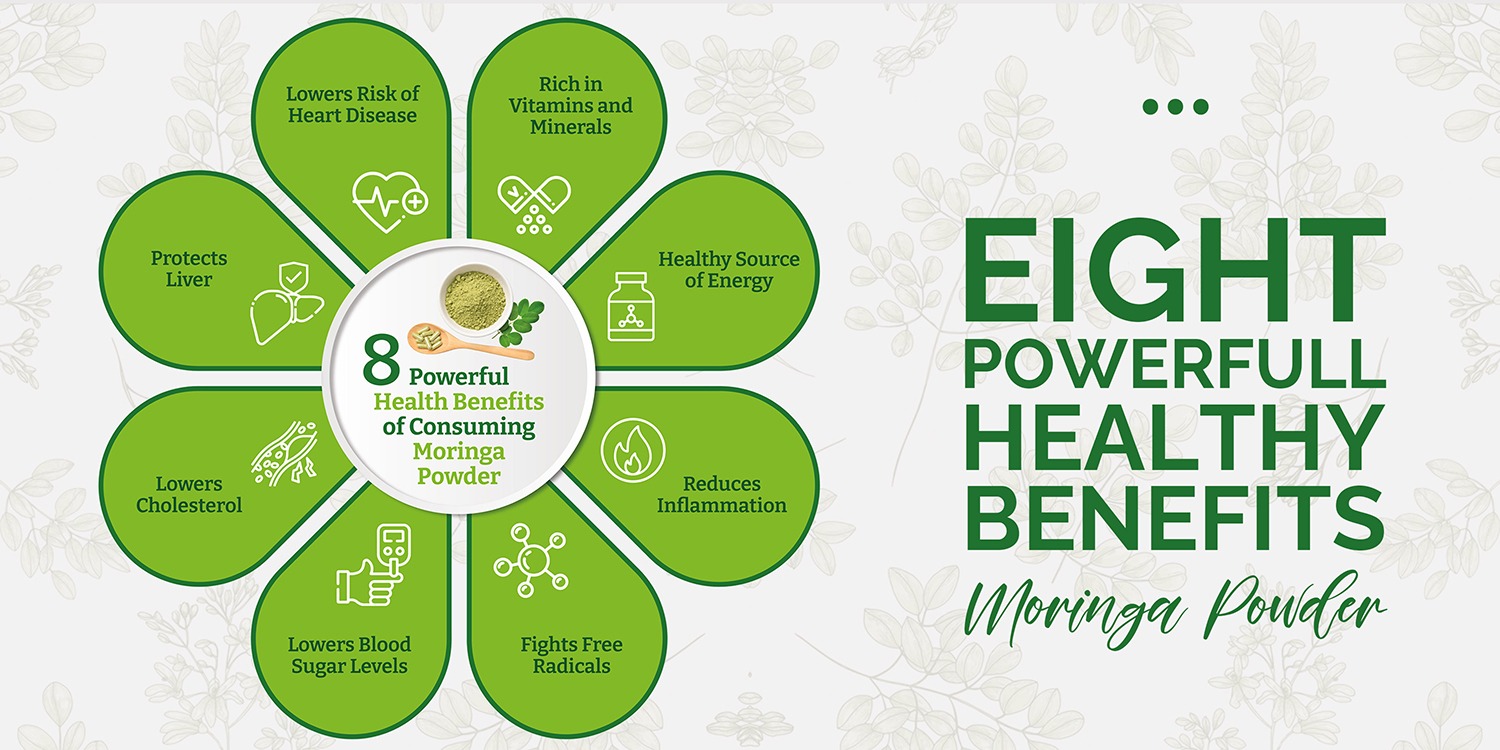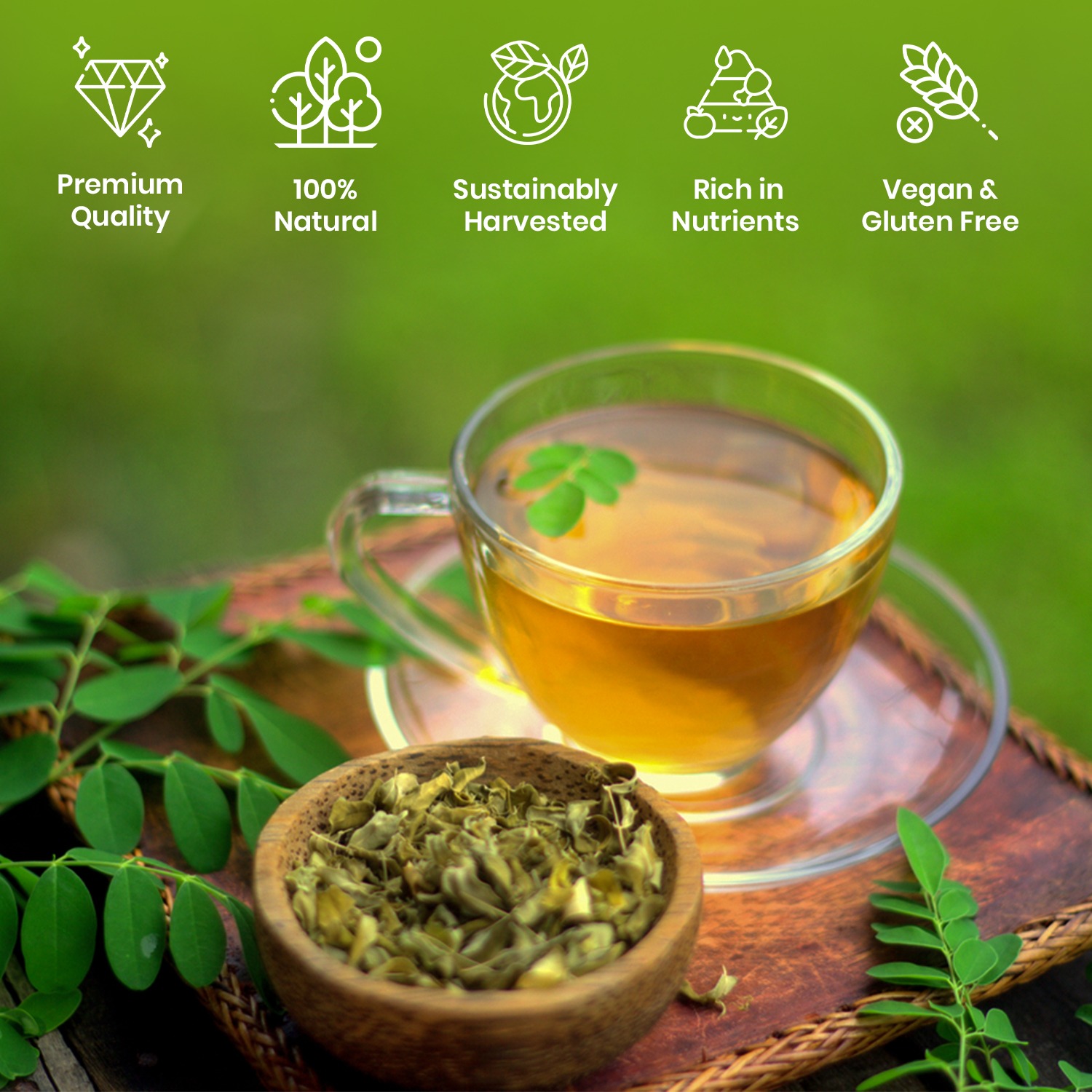Moringa vs Green Tea: A Comparison of Nutritional Benefits
Both moringa and green tea are known for their numerous health benefits and have been used for centuries in traditional medicine. Moringa, also known as the “miracle tree,” is a plant native to India and Africa that is considered a superfood due to its high nutritional content. Green tea, on the other hand, is made from the leaves of Camellia sinensis, a plant native to China and other parts of Asia. It is rich in antioxidants and has been shown to have a variety of health benefits. In this article, we will compare the nutritional benefits of Moringa and green tea, and examine the potential health benefits of consuming each. We will also look at any potential side effects or precautions that should be considered when consuming Moringa and green tea.
Moringa and green tea have both gained popularity in recent years due to their numerous health benefits. Moringa is considered a “superfood” and is known for its high nutritional content, including vitamins, minerals, antioxidants, and essential amino acids. It is also a rich source of antioxidants, which can help to protect the body against damage from free radicals. Some of the potential health benefits associated with consuming Moringa include improving heart health, reducing inflammation, and boosting the immune system.
Green tea, on the other hand, is known for its high antioxidant content, specifically the catechins, which are a type of flavonoids. The most abundant catechin in green tea is Epigallocatechin gallate (EGCG), which has been shown to have a variety of health benefits such as reducing the risk of heart disease, diabetes, and some cancers. It also has been found to aid in weight loss, improve brain function and has anti-aging effects. Additionally, green tea contains caffeine which can help with mental alertness, and theanine, which can improve mood.
Both Moringa and green tea are considered to be healthy additions to a diet, and they both have a long history of traditional use in various cultures. They are also both easy to incorporate into daily life, with Moringa available in supplement form, and green tea as a popular beverage.
Nutritional Comparison
Moringa and green tea both have a high nutritional content, but they differ in the specific vitamins and minerals they provide.
Moringa is a rich source of vitamins and minerals such as:
- Vitamin A: important for maintaining healthy vision and skin
- Vitamin C: important for the immune system and collagen production
- Vitamin K: important for blood clotting and bone health
- Calcium: important for strong bones and teeth
- Potassium: important for maintaining healthy blood pressure
- Protein: essential for growth and repair of body tissues
- Iron: essential for red blood cell production

Green tea, on the other hand, is a good source of antioxidants and other nutrients such as:
- Catechins: a type of flavonoids that act as antioxidants, specifically Epigallocatechin gallate (EGCG) which is the most abundant catechin found in green tea
- Theanine: an amino acid that can improve mood and mental alertness
- Caffeine: a stimulant that can help with mental alertness and concentration
- Vitamin C and Vitamin K
- Minerals such as fluoride, manganese, and chromium.
Both Moringa and green tea are also a good source of antioxidants. These can help protect the body against damage from free radicals. The antioxidants found in Moringa include quercetin, kaempferol, and beta-sitosterol. The antioxidants found in green tea are primarily catechins, including EGCG. It’s worth noting that the nutritional content of Moringa and green tea can vary depending on the specific growing conditions. Also, harvesting and processing methods.
The specific health benefits of Moringa and green tea can be attributed to the unique combination of vitamins, minerals, antioxidants, and other nutrients found in each.
Moringa is particularly high in vitamins A and C, which are important for maintaining healthy vision and skin and supporting the immune system, respectively. Vitamin K found in Moringa also helps in blood clotting and maintaining healthy bones. The iron content in Moringa can help to support the production of red blood cells and prevent iron-deficiency anemia. Moringa leaves are also known to be a good source of antioxidants, which can help to protect the body against damage from free radicals.
Green tea, on the other hand, is particularly high in antioxidants known as catechins, specifically Epigallocatechin gallate (EGCG). EGCG has been shown to have a variety of health benefits, including reducing the risk of heart disease, diabetes, and some cancers. The caffeine and theanine found in green tea can also improve mental alertness and mood, respectively. The fluoride found in green tea can also help to protect teeth against decay.
It is also worth noting that regular consumption of Moringa and green tea can have anti-inflammatory effects on the body. Which can help to reduce the risk of chronic diseases such as cancer, heart disease, and diabetes. Moringa leaves and green tea have also been found to have anti-obesity effects, and they may aid in weight loss.
It’s important to keep in mind that while Moringa and green tea have many potential health benefits, more research is needed to fully understand their effects and optimal dosage. It’s always advisable to consult with a healthcare professional before making any significant changes to your diet or supplement routine.
Potential Health Benefits
Moringa and green tea have both been associated with a variety of potential health benefits. Some of the most notable include:
- Improving heart health: Moringa is a good source of potassium. Which can help to lower blood pressure and reduce the risk of heart disease. Green tea, on the other hand, is high in antioxidants known as catechins, specifically Epigallocatechin gallate (EGCG). EGCG has been found to lower cholesterol levels, lower blood pressure and improve blood vessel function. Which can help to reduce the risk of heart disease.
- Reducing inflammation: Both Moringa and green tea have anti-inflammatory properties. Inflammation is a contributing factor to many chronic diseases such as cancer, heart disease, and diabetes. Reducing inflammation can help to lower the risk of these diseases.
- Boosting the immune system: Moringa is high in vitamin C, which is important for supporting the immune system. Green tea, on the other hand, is high in antioxidants. Antioxidants can help to protect the body against damage from free radicals. These can damage cells and weaken the immune system.
- Weight loss: Regular consumption of Moringa and green tea has been found to have anti-obesity effects. They may also aid in weight loss. Green tea catechins have been found to increase energy expenditure and promote fat oxidation, which can help with weight loss.
- Anti-cancer properties: The antioxidants found in Moringa and green tea may have anti-cancer properties. Studies have found that EGCG, a catechin found in green tea, may inhibit the growth and spread of cancer cells.

Green tea and moringa are both known for their numerous health benefits and have been used for centuries in traditional medicine. Both have high nutrient and antioxidant content, but they have some distinct differences in terms of their potential health benefits.
One of the main differences is that Moringa is particularly high in vitamins and minerals such as Vitamin A, Vitamin C, Vitamin K, Calcium, Potassium, and Iron, while green tea is particularly high in antioxidants known as catechins, specifically Epigallocatechin gallate (EGCG). EGCG has been shown to have a variety of health benefits, including reducing the risk of heart disease, diabetes, and some cancers.
Moringa leaves are also known to be a good source of antioxidants. These can help to protect the body against damage from free radicals. Moringa is also a good source of potassium. Which can help to lower blood pressure and reduce the risk of heart disease.
Green tea, on the other hand, is particularly high in antioxidants known as catechins, specifically Epigallocatechin gallate (EGCG), which can help to lower cholesterol levels, lower blood pressure, and improve blood vessel function, which can help to reduce the risk of heart disease. The caffeine and theanine found in green tea can also improve mental alertness and mood, respectively.
Both Moringa and green tea have anti-inflammatory properties and can help to boost the immune system. Regular consumption of Moringa and green tea has been found to have anti-obesity effects, and they may aid in weight loss. Green tea catechins have been found to increase energy expenditure and promote fat oxidation, which can help with weight loss.
Side Effects and Precautions
Moringa and green tea are generally considered safe for most people when consumed in moderate amounts. However, there are a few potential side effects and precautions that should be considered when consuming these products.
Moringa:
- Moringa leaves, seeds and pods are all considered edible and safe to consume. However, people with low blood sugar should use caution when consuming Moringa as it may lower blood sugar levels.
- Moringa supplements have not been evaluated by the FDA for safety or effectiveness. It is important to purchase supplements from reputable manufacturers.
- Moringa supplements can interact with blood-thinning medications, such as warfarin. It is important to speak with a healthcare professional before taking Moringa supplements if you are taking these medications.
Green Tea:
- Green tea contains caffeine, which can cause side effects such as jitteriness, insomnia, and increased heart rate in some people.
- Green tea can also interact with certain medications such as blood thinners, and should not be taken with them, or it is necessary to consult a healthcare professional before consuming.
- Pregnant or breastfeeding women should limit their consumption of green tea as it contains caffeine and may not be safe in high amounts.
It’s also important to note that consuming large amounts of Moringa or green tea can lead to an upset stomach. Also, other digestive problems, such as nausea, constipation, and diarrhea. It is always best to start with smaller amounts and work your way up to the desired amount. Also, consult a healthcare professional before making any significant changes to your diet or supplement routine.

Here are a few tips on how to safely consume moringa and green tea:
Moringa:
- Start with a small amount, such as 1-2 teaspoons of Moringa powder, and gradually increase the amount as your body adjusts.
- You can add Moringa powder to smoothies, soups, and stews, or use it as a seasoning for savory dishes.
- Avoid consuming large amounts of Moringa supplements as they may interact with blood-thinning medications.
- Consult a healthcare professional before taking Moringa supplements if you are taking blood-thinning medications, have low blood sugar, or are pregnant or breastfeeding.
Green Tea:
- Start with a small amount of green tea, such as one cup per day. Gradually increase the amount as your body adjusts.
- Avoid consuming large amounts of green tea, as it contains caffeine and may cause side effects such as jitteriness, insomnia, and increased heart rate in some people.
- Avoid consuming green tea at night as it contains caffeine which can affect sleep.
- Consult a healthcare professional before consuming green tea if you are taking certain medications, such as blood thinners, or if you are pregnant or breastfeeding.
It’s also important to make sure that you are purchasing high-quality products, whether it’s Moringa supplements or green tea. It’s best to purchase from reputable manufacturers and to check for any certifications or seals of approval.
In summary
Moringa and green tea are both popular natural products that are known for their health benefits. Moringa is a tree that is native to India, and its leaves are commonly used as a source of nutrition. Green tea, on the other hand, is made from the leaves of the Camellia sinensis plant and is known for its high levels of antioxidants.
Some key points of comparison between the two include:
- Nutritional content: Moringa leaves are a rich source of vitamins and minerals, including vitamin A, vitamin C, calcium, and iron. Green tea also contains antioxidants, such as catechins, but in smaller amounts compared to moringa leaves.
- Health benefits: Both Moringa and green tea have been found to have anti-inflammatory and antioxidant properties. Which can help protect against a range of diseases, including cancer and heart disease. Moringa leaves may also help lower cholesterol levels and blood sugar levels. Green tea may also help with weight loss, reduces the risk of certain types of cancer and promote heart health.
- Side effects: Consuming large amounts of either moringa or green tea may cause some side effects. For example, high doses of moringa may lower blood sugar levels too much, while consuming too much green tea may lead to anxiety or insomnia.
- Preparation: Moringa leaves can be consumed fresh, dried, or in supplements. Green tea is commonly consumed as a beverage, but can also be found in supplement form.
In summary, both Moringa and green tea are natural products that are known for their health benefits, but they have different nutritional content and preparation methods. They can be used together to enhance their benefits.

Here are a few recommendations for how to incorporate Moringa and green tea into a healthy diet:
Moringa:
- Start by adding 1-2 teaspoons of Moringa powder to your smoothies, soups, and stews, or use it as a seasoning for savory dishes.
- Incorporate Moringa leaves into your cooking, they can be used as a substitute for spinach or other leafy greens.
- Consider taking Moringa supplements, but make sure to purchase them from reputable manufacturers and to consult with a healthcare professional before taking them, especially if you are taking blood-thinning medications, have low blood sugar, or are pregnant or breastfeeding.
Green Tea:
- Start by drinking one cup of green tea per day, and gradually increase the amount as your body adjusts.
- Experiment with different types of green tea, such as sencha, matcha, or jasmine green tea, to find the one that you enjoy the most.
- Incorporate green tea into your daily routine, such as drinking a cup of green tea in the morning or in the afternoon.
- Green tea can also be used in cooking. You can also use green tea leaves to make a marinade for meat or fish, or add it to a stir-fry.
It’s also important to keep in mind that consuming Moringa and green tea should be part of a balanced diet that includes a variety of nutrient-dense foods. A healthy diet should include plenty of fruits, vegetables, whole grains, lean protein, and healthy fats. It’s also important to stay hydrated by drinking plenty of water. Also, limiting your intake of added sugars, saturated fats, and processed foods.
Moringa With Barry stores offer a variety of moringa products. These include: Moringa Powder, Moringa Tea, Moringa Capsules and Moringa Oil.
1. Moringa vs Ashwagandha: A Comparative Analysis of Benefits and Uses
2. Moringa vs Chlorella: Exploring the Nutritional Powerhouses
3. Moringa vs Spinach: Which Leafy Green Packs a Greater Nutritional Punch?
4. Moringa vs Fenugreek: Comparing Two Powerful Herbal Remedies
5. Moringa vs Turmeric: Unveiling the Health Benefits and Culinary Uses



1 Comment